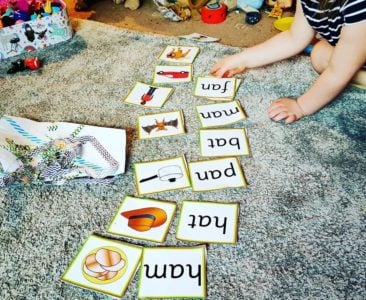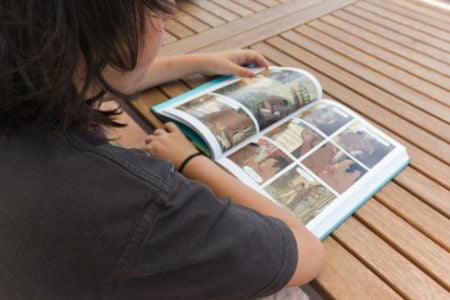Before kids can tackle Harry Potter, they have to master the basics. We usually start by teaching them the alphabet, focusing on letter names. Once they have those down, we introduce the sounds those letters make. This is the foundation of the phonetic alphabet.
After a child knows their sounds, the magic happens: they begin sounding out words. But English is tricky. It has complex rules where letter combinations change sounds unexpectedly.
To keep things frustration-free, we start with CVC (consonant-vowel-consonant) words. These simple three-letter building blocks are the secret sauce to teaching your child to read with confidence.
Key Takeaways
- Definition: CVC words follow a Consonant-Vowel-Consonant pattern (like “cat” or “pig”) and always use short vowel sounds.
- Importance: They are the simplest words to decode, helping children build early reading confidence.
- Method: Teach these words by segmenting (separating sounds) and blending (putting them back together).
- Progression: Start with simple rhyming families (like the -at family) before moving to mixed lists.
What Is A CVC Word?
A CVC word is a three-letter word that follows a specific pattern: it begins with a consonant, has a vowel in the middle, and ends with another consonant. Crucially, the vowel sound in the center is always a short vowel sound (1).
Here is the formula: Consonant + Vowel + Consonant = CVC.
Examples include “cat,” “hot,” and “rug.”
Why Are CVC Words Important?
These three-letter words are typically the first real words your child learns to read. They are the easiest entry point because they don’t contain tricky digraphs (like “sh” or “th”) or silent letters (like the magic “e”).
In a CVC word, every letter is a “short” letter, meaning it makes the exact sound your child learned in the phonetic alphabet (2).
By starting here, your child gets a quick win. They successfully sound out a word, which boosts their confidence and sparks a genuine enthusiasm for reading. You can use the CVC word lists below to guide your lessons.
Short A Words
The “short A” sound is the one you hear in “apple.” Here are common word families for this vowel:
- ab: cab, dab, gab, jab, lab, nab, tab
- ad: bad, dad, had, lad, mad, pad, sad, tad
- ag: bag, gag, lag, nag, rag, sag, tag, wag
- am: bam, dam, ham, jam, ram, yam
- an: ban, can, fan, man, pan, ran, tan, van
- ap: cap, gap, lap, map, nap, rap, sap, tap, yap, zap
- at: bat, cat, fat, hat, mat, pat, rat, sat, vat
- ax: fax, lax, max, sax, tax, wax
- Other Short A words: gal, pal, gas, yak
Short E Words
The “short E” sound is the one you hear in “elephant.”
- eb: web
- ed: bed, fed, led, red, wed
- eg: beg, keg, leg, Meg, peg
- em: gem, hem
- en: den, hen, men, pen, ten
- et: get, jet, met, net, pet, set, vet, wet
- Other Short E words: yes, pep, hex
Short I Words
The “short I” sound is the one you hear in “igloo.”
- ib: bib, rib
- id: bid, did, hid, kid, lid, rid
- ig: big, dig, fig, gig, pig, rig, wig, zig
- im: dim, him, rim
- in: bin, din, fin, pin, sin, tin, win
- ip: dip, hip, lip, nip, rip, sip, tip, zip
- it: bit, fit, hit, kit, lit, pit, sit, wit
- ix: fix, mix, six
Short O Words
The “short O” sound is the one you hear in “octopus.”
- ob: bob, cob, fob, hob, job, lob, mob, rob, sob
- od: cod, god, nod, pod, rod, sod
- og: bog, cog, dog, fog, hog, jog, log
- om: mom
- op: cop, hop, mop, pop, top
- ot: cot, dot, got, hot, jot, lot, not, pot, rot, tot
- ox: box, fox, pox
Short U Words
The “short U” sound is the one you hear in “umbrella.”
- ub: cub, dub, hub, nub, pub, rub, sub, tub
- ud: bud, cud, dud, mud
- ug: bug, dug, hug, jug, lug, mug, pug, rug, tug
- um: bum, gum, hum, mum, yum
- un: bun, fun, gun, nun, pun, run, sun
- up: cup, pup
- us: bus
- ut: but, cut, gut, hut, jut, nut, put, rut, tut
- ux: tux
How Do You Read CVC Words?
You read CVC words using a technique called “segmenting and blending.” This might sound technical, but it is actually quite simple.
The process works like this:
- Segmenting: Break the word into individual letter sounds (c – a – t).
- Phonics: Make the specific sound for each letter aloud.
- Blending: Stretch the sounds together to form the complete word (caaaat… cat!).
Once a child recognizes individual letters and their sounds, they are ready to decode CVC words.
Start by focusing on beginning sounds. You can use a worksheet with a picture of an item (like a pig) and the last two letters of the word: ___ig.
Encourage your child to say the word aloud and identify the first sound they hear. In this case, it’s “P.” Have them write “P” in the gap, then read the full word.
Next, move to ending sounds. Use the same principle in reverse. Your sheet might read pi___. Ask your child what sound they hear at the end of the word.
The third stage is the middle sound (the vowel). This is often the hardest part for new readers to hear. Have them fill in the blank for p___g.
Finally, once they have mastered all three positions, give them a blank space under the picture and have them write the entire word from scratch.
Ways To Use CVC Word Lists With Students
Drilling lists can get boring fast. Here are some engaging ways to use these word lists to spark joy in the classroom or at home.
Buddy Reading
Pair up your children, matching a confident reader with one who is still learning. Have them take turns reading the CVC words from the list.
Encourage them to act as “teachers,” helping each other sound out the individual letters and blend them. If each child has their own list, let them cross out the words as they master them to gamify the process.
Memory Recall
At the end of a lesson, hide the word list and give your child a blank sheet of paper. Ask them to write down as many CVC words as they can remember.
Alternatively, provide a list with only one word per family (e.g., “cat”) and ask them to write down words that rhyme (bat, hat, mat).
Spelling Bee Lite
Use CVC words to introduce spelling without the pressure of a big test.
Read words from the CVC list aloud and have your children write them down. This builds the connection between the sounds they hear and the letters they write.
Gamified Flashcards
Print the lists above, cut them up, or write them on index cards. You can use these flashcards for several classic games:
- Speed Read: Flip them over and see how fast they can read the word.
- Memory: Make two sets of cards, place them face down, and try to find matches.
- Go Fish: Print four sets and play a standard game of Go Fish, asking for words instead of numbers.
Scavenger Hunt
Give each child a copy of the CVC list and a highlighter. Read a storybook aloud that contains many of the words from the list.
Every time the children hear a word from their list, they have to find it and highlight it. This encourages active listening and quick word recognition.
FAQs
In Conclusion
Teaching your child to read is a marathon, not a sprint, but CVC words are the perfect starting line. By focusing on these simple three-letter combinations, you are giving your learner the tools they need to decode the language rather than just memorizing it.
Remember to keep practice light, fun, and consistent. Before long, those individual sounds will blend into words, and those words will turn into stories.






